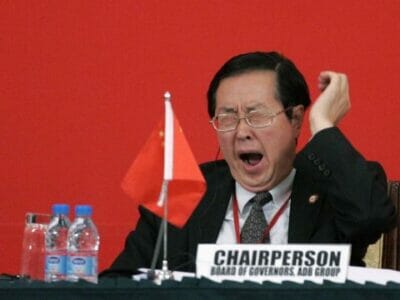
PBOC Governor Zhou Xiaochuan seems tired of the current downturn.
There may not have been a red envelope, but China’s real estate industry received a pair of new year gifts recently that may have been just as welcome.
On Wednesday China’s central bank cut the reserve ratio requirement, which restrains the amount of money that banks can loan out, by half of a percentage point freeing up the country’s lenders to put more cash into the economy.
Together with some more targetted changes in lending controls introduced the same day by the People’s Bank of China (PBOC), the change in banking guidelines is said to have freed up more than $100 billion for distribution as loans.
The banking boost was followed the next day by Kaisa Group, the troubled Shenzhen developer that had become the poster child for China’s real estate risks, successfully making an interest payment on a bond. The company’s technical default on the payment on January 8th had triggered a rush by creditors to call in loans and sent China’s developer bonds plummeting on international markets.
Central Bank Expected to Support the Property Sector
The decision by the central bank to cut reserve requirements was widely seen as an effort to support the country’s real estate sector, which is currently mired in a nearly year-long slump.
Within a day of the rate cut being announced, UBS had upgraded the entire China real estate sector from Sell to Neutral, expecting the liquidity measure to spur more home sales.
China’s home sales slid by 7.8 percent in 2014, contributing to an overall slowdown in the economy that led to the country missing its GDP growth target for the first time in 15 years.
China’s economic growth slowed to 7.4 percent last year as home prices fell from May through the end of the year. Although the market has shown signs of picking up in January, it still is faced with ever larger surpluses of unsold homes.
With this in mind, experts on China’s economy predicted more moves by the PBOC. Goldman Sachs economist Yu Song was quoted in an article in CNBC as saying, “More RRR cuts are likely. With policymakers having demonstrated a willingness to use broad RRR cuts, we expect to see more, though the next may come with a significant lag (likely Q2).
In the same account, Zhiwei Zhang, chief economist and head of equity strategy, China at Deutsche Bank predicted another 50 basis point RRR cut in the second quarter and two interest rate cuts – once in March and again in the second quarter.
Kaisa Makes Bond Payment
China’s real estate companies will also receive a credit boost from Kaisa’s successful interest payment. After Sunac agreed earlier in the week to acquire a 49.3 percent stake in the troubled Shenzhen developer, Kaisa successfully paid $25.6 million in interest due to holders of a $500 million bond.
Kaisa’s failure to meet the initial deadline for payment on January 8th had brought down share prices for many Chinese developers, and led to the entire sector being locked out of international bond markets during January.
By avoiding being the first Chinese real estate developer to default on its international bonds, Kaisa saved not only itself, but most likely many other Chinese property firms who would have found it much more challenging to raise capital on international markets.
When Shanghai-based Shimao, whose notes are considered investment grade, raised a $800 million bond last week, it had to provide yields estimated at 87 basis points higher than the developer would have expected to pay before the Kaisa default.
In a sign of renewed investor confidence, Kaisa’s stock rose 17.6 percent today on the Hong Kong exchange, the first day of trading for the company’s shares since they were frozen in late December. Kaisa’s shares were also up 3.46 percent today.

Leave a Reply